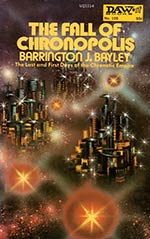
![]() BigEnk
BigEnk
1/19/2025
![]()
A very welcome and unexpected surprise. A cross between the weirdness of PKD and the space opera of Alastair Reynolds, The Fall of Chronopolis is time travel story focused on the end of the Chronotic Empire while it struggles for control of time-stable nodes with an adversarial group called the Hegemony, who use a weapon that is capable of deleting entire cities from time itself. A few primary characters are followed, including a former commander of time fleet, members of the ruling self-incestuous aristocracy, and a woman hunted for sacrifice by a heretical religious group. The world as we know it exists "like the skin that forms on the surface of a liquid" surrounded by a sea of potential time, colloquially known as the 'strat', where anything is possible and sanity goes to die.
This is an imaginative world, full of vivid imagery that makes it come alive on the page. Bayley strikes an unrelenting pace that doesn't stop for a moment to smell the roses, a skill that Reynolds could take a lesson in. A sweet little gobstopper of a book, ripe for a fun afternoon of reading as you revel in his creativity. The images that Bayley draws, especially scenes that involve or take place in the 'strat', are memorable, hard, and dark.
Surprisingly Bayley also takes some time to ruminate on the human soul and its passage through time. It's really interesting that he weaves Christianity into a world where resurrection is a fact, and the adversary exists as a demon of deep potential time. Make no mistake, its roots are firmly planted in pulp science fiction, but that doesn't prevent it from delving into the metaphysical.
The Fall of Chronopolis is an idealized version of what I hope all these slim SF books from the 60's and 70's contain. In reality, too many of them are a disappointment, where imaginative ideas fall to the wayside in favor of office drama and bourbon sipping. I'm not saying this is a perfect book by any stretch of the imagination. It's convoluted and sometimes nonsensical, relying far to much on plot conveniences, but in terms of pure entertainment it was a joy. It quenched a very specific and deep-seeded thirst that's hard to sate.